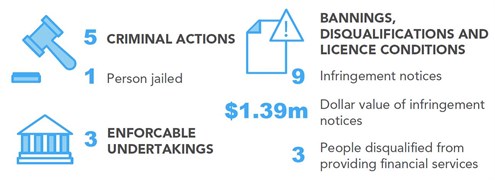Financial markets fund the economy and, in turn, economic growth. But they can’t do this without the trust and confidence of investors.
ASIC focuses on investor trust and confidence through its work to ensure Australia’s financial markets are fair and efficient. We set standards and educate stakeholders, pursue behavioural change and take enforcement action to disrupt market misconduct.

This report highlights some of the activities we undertook between 1 January and 30 June 2017, and outlines our priorities for the rest of 2017.
 Standards and education
Standards and education
At ASIC, we look closely at the effect of different behaviours on our markets. Our observations inform the standards we set and how we educate our stakeholders.
Distributed ledger technology
In the last few years, there has been intense interest in distributed ledger technology (DLT) – also known as blockchain technology – from operators of financial market infrastructure, financial institutions, financial services providers and innovative fintech firms around the world.
To date, we have seen DLT used in foreign exchange remittance payments, securities settlement systems, debt issuance programs and digital identity initiatives – and we expect the range of potential applications of DLT to keep growing.
To help our stakeholders navigate changes to their operations and the structure of the market in which they offer their services we released an information sheet in March 2017.
Information Sheet 219 Evaluating distributed ledger technology is designed to educate stakeholders about the regulatory issues of this emerging technology. The information sheet includes an assessment tool for evaluating DLT-based services that is made up of six broad questions. These are the questions we are likely to ask when we assess whether the use of DLT by a service provider or infrastructure operator would allow the person to meet their regulatory obligations.
As DLT continues to evolve, we will use the assessment tool to engage with and educate stakeholders about any regulatory issues that arise.
SSX listing standards
Well-functioning financial market infrastructure is critical to the integrity and reputation of the Australian equity market and the trust and confidence investors have in it. As one of only a small number of domestic listing markets, Sydney Stock Exchange Limited (SSX) has an important role to play in upholding standards expected of listing markets in Australia.
In March we published our assessment of SSX’s listing standards. The report found that SSX needed to make a number of changes to improve compliance with its statutory obligations. These changes include:
- putting adequate arrangements in place to manage conflicts between its commercial interests
- operating a listing market that is fair and efficient, and
- improving how it monitors and enforces compliance with its listing rules, including whether an entity is appropriate for admission to its market.
SSX agreed to additional licence conditions and has introduced operational controls to support compliance with its statutory obligations. These controls are focused on reinforcing the independence of its board – and admissions and market supervision committees – so it can better manage the conflicts that arise from its exchange ownership structure.
Note: This was the second of our targeted assessments of listing standards across Australian listing markets. See also our assessments of ASX Limited and National Stock Exchange Australia Limited. We have also published good practice principles for listing standards, which consolidate our expectations for domestic listing markets.
Cyber resilience
A cyber attack can quickly undermine an organisation and destabilise markets, eroding investor trust and confidence in Australia’s financial system. To help raise awareness of cyber risk we have engaged with industry to assess and measure the level of cyber resilience in our financial markets.
In April ASX launched the ASX 100 Cyber Health Check Report (PDF 5.2 MB) report in collaboration with ASIC. The report examined the cyber security risk-awareness of Australia’s top-100 listed companies. It also looked at their cyber risk prevention and response measures. One of the key trends identified is that, while companies are managing cyber risk better, there’s still more to do.
Note: See Appendix B of the report for a list of questions boards and senior management should be asking to test their organisiation's cyber reilience.
Sell-side research
The integrity of sell-side securities research directly affects the integrity of financial markets, particularly during the capital raising process. Where material, non-public information is mishandled or conflicts involving research are not managed appropriately there is a risk of information asymmetries developing in our markets – affecting investor confidence and participation in our markets.
To improve market practices around sell-side research we recently released Consultation Paper 290 Sell-side research. Consultation Paper 290 proposes updated guidance for sell-side research. The guidance will set out our expectations of how participants should handle confidential information and manage conflicts of interest when providing research.
Market reform
We have also worked closely with Government to drive reforms and set standards aimed at supporting fair and efficient markets in Australia, including:
- a framework for the new financial benchmark regulatory regime that is designed to ensure Australia's financial benchmarks operate within a contemporary regulatory framework (see Consultation Paper 292 Implementing the financial benchmark regulatory regime)
- changes to the client money regime, so protection of retail over-the-counter (OTC) derivative client money is more consistent with the protection of client money provided for other services
- reforms to the market licensing regime to facilitate emerging and specialised markets, and
- consultation on safe and effective competition in cash equity settlement in Australia with the Council of Financial Regulators (CFR) and the Australian Competition and Consumer Commission. This builds on our work with the CFR in 2016 on competition in clearing for Australian cash equity markets which was endorsed by Government.
 Behavioural change
Behavioural change
Achieving behavioural change is an important part of our work. Through early intervention, we may be able to prevent risky conduct, potential breaches and investor losses, before they occur.
Systems and controls
Market participants should operate with a culture and conduct risk framework that supports the integrity of Australia’s retail and wholesale markets. Having appropriate systems and controls is integral to making sure this happens.
In March we accepted enforceable undertakings (EUs) from Westpac Banking Corporation (Westpac) and Australia and New Zealand Banking Group Limited (ANZ) to address gaps in their wholesale spot foreign exchange (FX) businesses.
The EUs followed an investigation into the activities of these businesses between 1 January 2008 and 30 June 2013. We were concerned that, during this period, both banks’ systems and controls may not have been adequate to address risks of specific inappropriate conduct identified by ASIC.
We are committed to making sure major financial institutions have effective mechanisms in place to ensure their employees are trained, monitored and supervised to provide financial services efficiently, honestly and fairly.
Westpac and ANZ also made community benefit payments of $3 million each towards advancing financial capability and literacy.
Driving better behaviour in the wholesale spot FX market
Our investigations into the spot FX market uncovered conduct in some of Australia’s largest financial institutions that fell short of our expectations. While we have taken enforcement action where appropriate, our focus has now moved to making sure this doesn’t happen again.
Drawing on observations from our investigations, we released Report 525 Promoting better behaviour: Spot FX. Report 525 takes a close look at the behavioural drivers likely to lead to poor conduct within the FX businesses of major Australian financial institutions.
With a daily average turnover of US$31.4 billion in Australia, the spot FX market is of systemic importance to the Australian economy. The effective functioning of the spot FX market relies on all participants acting with integrity and fairness.
Report 525 also sets out good practice principles for managing these drivers to more effectively prevent, detect and respond to inappropriate practices. We encourage all participants in FX markets to consider adopting these principles to improve their internal arrangements for managing the risks of inappropriate conduct. Report 525 should be considered alongside the FX Global Code of Conduct.
 Disruption
Disruption
Most people who manipulate the market do so for individual gain – to increase the value of their own or their clients’ investment, to earn a bigger bonus, or to promote their reputation or career. We take enforcement action to make sure misconduct is dealt with and disrupted.
Insider trading
Insider trading is a serious threat to market integrity. Markets can only operate fairly when information is accurate and available to all. Leaks of information create false markets and harm investors’ trust and confidence, discouraging participation. When we see this type of market misconduct, we will act.
In April Steven Robert Noske was sentenced to 18 months’ imprisonment and fined $20,000 after being found guilty of insider trading by a jury in the Supreme Court of WA. He was also automatically disqualified from managing corporations for five years.
Mr Noske’s trading resulted in a profit of $51,246.34. His profit would have been significantly higher had he sold his entire holding shortly after the announcement.
The sentence demonstrates the seriousness with which insider trading is viewed. It is also a reminder of the significant obligations of those with access to market-sensitive information. Our surveillance of the market means that anyone who attempts to profit from insider information runs a very real risk of being convicted and jailed.
Markets Disciplinary Panel
The Markets Disciplinary Panel (MDP) is a peer-review body that exercises ASIC’s power to issue infringement notices or accept enforceable undertakings for alleged breaches of the ASIC market integrity rules.
Between January and June, the MDP issued eight infringement notices imposing total penalties of $1,265,000.
For example, in June UBS Securities Australia Limited (UBS) paid penalties totaling $280,000 to comply with two infringement notices given to it by the MDP.
The first infringement notice ($140,000) related to the operation, use and monitoring of the UBS Price Improvement Network crossing system.
The second infringement notice ($140,000) related to incorrect disclosures in crossing confirmations about execution venue and trading as principal, and the provision of incorrect regulatory data to market operators.
Compliance with each infringement notice is not an admission of guilt or liability, and UBS is not taken to have contravened subsection 798H(1) of the Corporations Act 2001.
Note: In addition to the MDP outcomes, Westpac paid an infringement notice penalty for an alleged breach of the ASIC Derivative Transaction (Reporting) Rules 2013.
What’s next?
We will focus on the following existing and emerging risks over 2017:
- Technology and cyber resilience: We will be reviewing the technology and operational risk of our stakeholders. We will continue to:
- provide cyber self-assessment questionnaires to market intermediaries to understand market practice and provide feedback, and
- conduct compliance reviews of technology-dependent offerings.
- Conduct: We are continuing our focus on conduct that enhances market integrity across all market-based activities. In particular, we are asking firms to consider whether their controls are appropriate.
- Effective capital markets: We will review market activity in the OTC sector of the market, primarily fixed income, currencies and commodities (FICC), and equity derivatives. We will also:
- use Report 525 in our surveillance of the FX market and, where appropriate, broader wholesale OTC markets,
- consider allocation processes in equities markets, and
- continue to build on our existing market surveillance capabilities.
Read the market supervision strategic priorities letter 2017–18 for more information about each of these priorities.
For regular updates on the markets work ASIC is doing, subscribe to our monthly e-newsletter.
